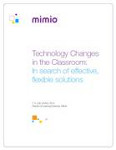 | | | Head of the Class |  | | |  | - Why students should bring their own technology to class
For schools that are implementing bring-your-own-technology programs, the fact that students use their own devices is more important than the technology itself, according to a recent report. "[Your personal technology] becomes an extension of the world around you. If you have to use someone else's, it takes a while to get into it," said Aaron Sams, a science teacher at Woodland Park High School in Colorado. Education Week/Finding Common Ground blog (9/22)       - Can BYOT help improve instruction?: A New Hampshire high school recently began allowing students to use their own technology devices in school, to help engage students with varied learning styles in lessons. A test period for the program will take place over the fall, and already students say they are bringing -- and using -- their own iPads, laptops and cellphones for educational purposes. After the trial period, officials say they will evaluate whether the bring-your-own-technology program helped students learn. The Telegraph (Nashua, N.H.) (9/23)
       |  |
Technology of all sorts is making its way into the classroom and offering new ways to engage learners with interactive lesson content. Learning Scientist, T. V. Joe Layng, Ph.D., provides perspective on how districts can make informed choices for effective technology implementation. Download our FREE whitepaper. | |
|  | | eLearning |  | | |  | - Typing lessons are transformed in middle schools
A Wisconsin school district has adopted a new instructional method, called the Herzog method, to teach sixth-grade students how to type. Rather than focusing on the "home keys" and drills, students will learn where all letters are on the keyboard and then practice by completing actual class assignments. Because most students already are familiar with the keyboard by middle school, the focus now is on teaching them to type faster, educators say. Green Bay Press-Gazette (Wis.) (9/21)        |  | Reading Intervention Webinar Series, Part 1: 9/25, 2pm ET
Join Foundations in Learning's panel of experts on Tuesday, Sept. 25, at 2:00pm ET to discuss Reading Intervention in the general population. Learn what has worked at Hillside Elementary School in West Des Moines, Iowa, and how RTI Tier II strategies have improved automatic word recognition skills and have facilitated fluency and comprehension. Register Now |
 |  | | Systems Management |  | | |  | - Samsung pilots new school technology
Samsung has selected a middle school in Tennessee to test its product, in a pilot program that could shape future education-technology roll-outs by the company. Among other things, students and teachers will test the use of interactive whiteboards, wireless printers and Galaxy Note tablets that come with stylus pens. Students will use the technology to complete classroom work, take notes and text their teachers with questions. The Commercial Appeal (Memphis, Tenn.) (free registration) (9/22)        |  | Today's customers don't just expect to be able to make a transaction from anywhere—they demand it. Learn how IBM® Connectivity & Integration solutions help to meet this need by enabling you to open more channels, devices and endpoints—fast. They can also help reduce integration costs by up to 80%. Learn more. |
  |  | | Managing Budgets |  | | |  | - Britain's schools lose out in technology scheme
At least 169 schools in Britain were victims of a scheme in which they were required to pay more than the market value to lease technology. Many schools have been saddled with large amounts of debt -- and now are facing closure -- after two companies associated with the scheme went out of business. Now, Clydesdale Bank has agreed to forgive debt related to the scheme for 27 schools. BBC (9/23)        |  | Discover the NOVEL LEARNING SERIES™ from NICHOLAS SPARKS. These student editions with learning guides of THE LAST SONG, A WALK TO REMEMBER, THREE WEEKS WITH MY BROTHER, and THE NOTEBOOK align with the ELA Common Core State Standards. The ideal choice for teen readers at every level. Read more here. |
 |  | | Schools and Social Media |  | | |  | - Teachers share, sell lesson plans online
Georgia kindergarten teacher Deanna Jump is one of 26 teachers who have earned more than $1 million by selling their lesson plans on the TeachersPayTeachers website, writes Andrew J. Rotherham, co-founder of the nonprofit Bellwether Education. He writes that other sites allow teachers to collaborate and share their lesson plans for free. "Regardless of who foots the bill for more-effective lesson plans, this sort of professional sharing is long overdue," Rotherham writes. Time.com/Ideas (9/20)       - Education Nation sparks feedback on Twitter
 Education blogger Valerie Strauss shares in this blog post her picks for the top 10 tweets from this weekend's kick-off of NBC's Education Nation. In one post on Twitter, Sabrina Stevens @TeacherSabrina writes "Correction- *165%* increase in amount spent on testing. In a time when US asks parents to pay for bus service & lays off teachers. #EdNatTTH" In another tweet, a viewer celebrates a teacher's assertion that standardized testing has taken a toll on creativity in schools. The Washington Post/The Answer Sheet blog (9/23) Education blogger Valerie Strauss shares in this blog post her picks for the top 10 tweets from this weekend's kick-off of NBC's Education Nation. In one post on Twitter, Sabrina Stevens @TeacherSabrina writes "Correction- *165%* increase in amount spent on testing. In a time when US asks parents to pay for bus service & lays off teachers. #EdNatTTH" In another tweet, a viewer celebrates a teacher's assertion that standardized testing has taken a toll on creativity in schools. The Washington Post/The Answer Sheet blog (9/23)        |  | Stage a memorable staff development experience with School Play, an award-winning documentary film that reveals the profound impact of knowing and nurturing students, both at school and at home. The extensive Study Guide provides options for both full- and half-day workshops, discussion questions, handouts, and more. Click here now for details! |
 |  | - Colleges tackle Big Data talent drought
With the U.S. facing a potential shortage of data analysts, colleges and universities are stepping up their efforts to fill the gap by graduating more students with Big Data experience. A number of universities are now offering advanced degree programs in data analytics, and while enrollment remains low, data show that graduates of such programs are all but guaranteed employment at competitive salaries. Computerworld (9/21)        | Do not wait to strike till the iron is hot; but make it hot by striking."
--William Butler Yeats,
Irish poet and playwright       |
|
| SmartBrief delivers need-to-know news in over 100 targeted email newsletters to over 3 million readers. All our industry briefings are FREE and open to everyone—sign up today! | | |
| This SmartBrief was created for jmabs1@gmail.com |
| Advertise | | Publisher, Education Group: Joe Riddle 202-407-7857 | | | | | | | | | | Recent SmartBrief on EdTech Issues: - Friday, September 21, 2012
- Thursday, September 20, 2012
- Wednesday, September 19, 2012
- Tuesday, September 18, 2012
- Monday, September 17, 2012
| | | Lead Editor: Katharine Haber
Contributing Editor: Erin Cunningham
Mailing Address:
SmartBrief, Inc.®, 555 11th ST NW, Suite 600, Washington, DC 20004 | | | | | | © 1999-2012 SmartBrief, Inc.® Legal Information | |


No comments:
Post a Comment